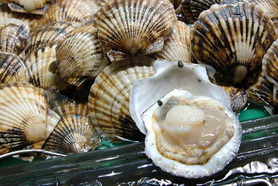On March 2, 2016, approximately 20 people involved in the shellfish industry on Long Island, NY met with Dr. Chris Gobler at his Stony Brook University laboratory to learn about some of the threats climate change could pose to shellfish hatchery and grow-out operations. Participants included county shellfish managers, town hatchery operators, private shellfish companies, and representatives of the Shinnecock Nation. Dr. Gobler explained coastal acidification and hypoxia impacts on larval and juvenile bivalves (clams, scallops and oysters) that resulted from his NCCOS and New York Sea Grant funded project .

The project disclosed decreased survival and growth with increasing acidification and decreasing oxygen. A new project funded by New York Sea Grant builds on prior NCCOS-funded laboratory work to document the co-occurrence of acidification, low oxygen and thermal stress at Long Island hatcheries and grow-out sites. Ultimately, Dr. Gobler hopes to provide options for mitigating climate impacts to the Long Island shellfish industry.
The industry representatives appreciated understanding current climate impacts and enthusiastically offered their sites for the new study. Those who work in and on coastal waters are at the front lines of climate change. Increasing water temperatures, acidifying waters and low oxygen events can impact the production and harvest of important shellfish resources.
